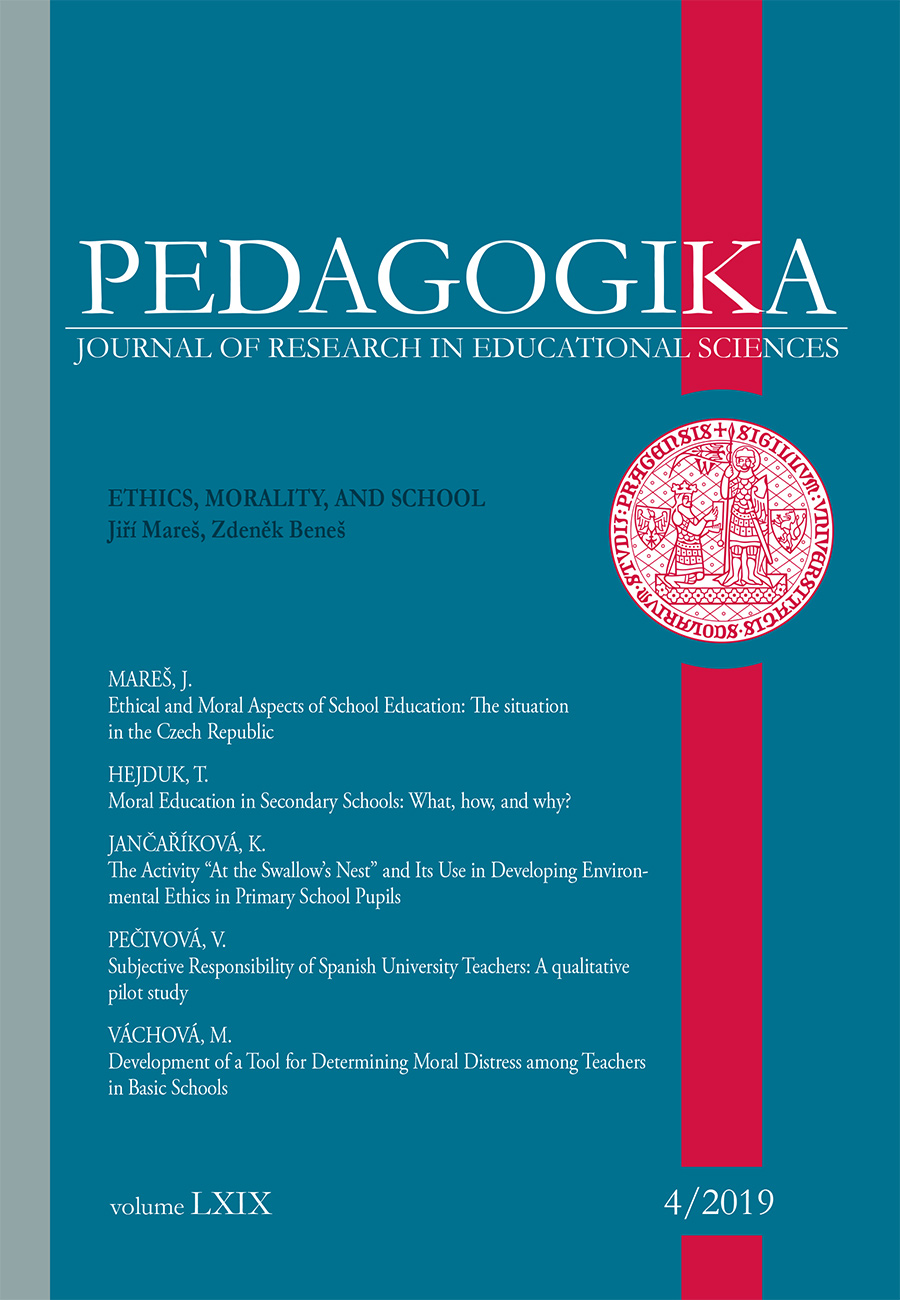Subjective Responsibility of Spanish University Teachers: A qualitative pilot study
DOI:
https://doi.org/10.14712/23362189.2019.1523Keywords:
teacher responsibility, teachers’ professional identity, university teachers, commitment, teachers’ professional ethicsAbstract
Abstract: Teacher subjective responsibility is a prominent component of teachers’ professional identity. It has a great impact on teachers’ attitudes to various aspects and ethical questions relating to their profession and thus influences their performance.
Aims: The pilot study presented in this paper aimed to reveal the position of teacher subjective responsibility within the self-perceived identity of teachers and to find its relations to individual ingredients of teachers’ professional identity. The participants in our pilot study were four Spanish university teachers preparing future primary school teachers for their careers.
Methods: To gain a deeper insight into the teachers’ perception of their subjective responsibility we opted for a qualitative design and conducted semi-structured interviews. Having chosen a phenomenological approach, we concentrated on the participants’ understanding of their subjective responsibility and its effects. We focused on the teachers’ self-perception and inquired about the path that had led them to their profession and also about their teaching experience, searching for links connecting these to their subjective responsibility.
Results: The research results demonstrate that our participants do feel responsible for a number of issues and they also reveal a particularly strong connection between teacher subjective responsibility and their commitment. The inquiry also indicated that commitment, closely interconnected with subjective responsibility, comes with a price, affecting the personal lives of the participants.
Conclusions: Although our preliminary findings are limited because of the small number of participants and the strategy of a single interview, we believe that we have taken the first steps to understanding teacher subjective responsibility regarding its position within the broader context of teachers’ professional identity.
Keywords: teacher responsibility, teachers’ professional identity, university teachers, commitment, teachers’ professional ethics
References
https://doi.org/10.1016/j.tate.2010.08.013
Beauchamp, C., & Thomas, L. (2009). Understanding teacher identity: An overview of issues in the literature and implications for teacher education. Cambridge Journal of Education, 39(2), 175-189.
https://doi.org/10.1080/03057640902902252
Daniels, L. M., et al. (2017). Combinations of personal responsibility: Differences in pre-service and practicing teachers' efficacy, engagement, classroom goal structures and wellbeing. Frontiers in Psychology, 8, 906.
https://doi.org/10.3389/fpsyg.2017.00906
PMid:28620332 PMCid:PMC5449472
Daniels, L., Poth, C., & Goegan, L. D. (2018). Enhancing our understanding of teachers' personal responsibility for student motivation: A mixed methods study. Frontiers in Education, 3, 91.
https://doi.org/10.3389/feduc.2018.00091
Dofková, R., & Zdráhal, T. (2018). The responsibility for student's achievement applied to pre-service elementary school math teachers. INTED2018 Proceedings, 1387-1394.
https://doi.org/10.21125/inted.2018.0235
Eren, A, & Çetin, G. (2018). Pre-service teachers' beliefs about the teaching profession, curriculum orientations, and personal responsibility. Curriculum Perspectives, 39(1), 19-32.
https://doi.org/10.1007/s41297-018-00061-1
Frumos, L. (2015). Teachers' sense of efficacy and responsibility for students' outcomes. Journal of Innovation in Psychology, Education and Didactics, 19(2), 255-262.
Guskey, T. R. (1981). Measurement of the responsibility teachers assume for academic successes and failures in the classroom. Journal of Teacher Education, 32(3), 44-55.
https://doi.org/10.1177/002248718103200310
Kantorková, H., & Mareš, J. (1992). Subjektivní odpovědnost studentů učitelství za žákovské výsledky [Subjective responsibility of student teacher for pupil achievement]. In V. Krejčí (ed.), Sborník prací Ostravské univerzity: Psychologie, pedagogika, tělesná výchova [Proceedings of the University of Ostrava: Psychology, pedagogy, physical education]. University of Ostrava.
Lankveld, T., Shoonenboom, J., Volman, M, Croiset, G., & Beishuizen, J. (2017). Developing a teacher identity in the university context: A systematic review of the literature. Higher Education Research & Development, 36(2), 325-342.
https://doi.org/10.1080/07294360.2016.1208154
Lauermann, F. (2014). Teacher responsibility from the teacher's perspective. International Journal of Educational Research, 65, 75-89.
https://doi.org/10.1016/j.ijer.2013.09.005
Lauermann, F. (2017). Teacher motivation, responsibility, pedagogical knowledge and professionalism: A new era for research. In S. Guerriero (ed.), Pedagogical knowledge and the changing nature of the teaching profession (p. 172). OECD.
Lauermann, F., & Karabenick, S. A. (2011). Taking teacher responsibility into account (ability): Explicating its multiple components and theoretical status. Educational Psychologist, 46(2), 122-140.
https://doi.org/10.1080/00461520.2011.558818
Lauermann, F., & Karabenick, S. A. (2013). The meaning and measure of teachers' sense of responsibility for educational out comes. Teaching and Teacher Education, 30, 13-26.
https://doi.org/10.1016/j.tate.2012.10.001
Lukas, J. (2007). Vývoj učitele: přehled relevantních teorií a výzkumů [Teacher development: An overview of relevant theories and research]. Pedagogika, 57(4), 46-60.
Lukášová, H. (2015). Učitelské sebepojetí a jeho zkoumání [Teachers self-concept and its exploration]. Zlín: Tomas Bata University in Zlín, Faculty of Humanities.
Mareš, J., Skalská, H., & Kantorková, H. (1994). Učitelova subjektivní odpovědnost za školní úspěšnost žáků [Teacher's subjective responsibility for school success of pupils]. Pedagogika, 44(1), 23-36.
Matteucci, M. C., Guglielmi, D., & Lauermann, F. (2017). Teachers' sense of responsibility for educational outcomes and its associations with teachers' instructional approaches and professional wellbeing. Social Psychology of Education, 20, 257-298.
https://doi.org/10.1007/s11218-017-9369-y
Matteucci, M. C., & Kopp, B. (2013). "Do they feel responsible?" Antecedents of teachers' sense of responsibility. In Proceedings of 5th International Conference on Education and New Learning Technologies. Barcelona, 5013-5017.
Seidman, I. (2006). Interviewing as qualitative research: A guide for researchers in education and the social sciences. New York: Teachers College Press.
Silverman, S. K. (2010). What is diversity? An inquiry into preservice teacher beliefs. American Educational Research Journal, 47(2), 292-329.
https://doi.org/10.3102/0002831210365096
Šeďová, K., et al. (2016). Pojetí výuky a profesní identita začínajících vysokoškolských učitelů [The concept of teaching and professional identity of beginning university teachers]. Studia paedagogica, 21(1), 9-34.
https://doi.org/10.5817/SP2016-1-2
Švaříček, R. (2011). Critical incidents in forming the professional identity of the teacher. Pedagogika.sk, 2(4), 247-274.



